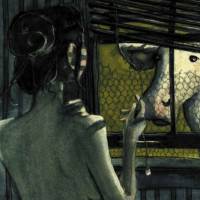Japan's postwar years were marked by raw needs and wounds, as well as great societal change. A glimpse of the era is offered in this collection of stories by Nobuo Kojima (1915-2006), most of which appear in English for the first time.
Long Belts and Thin Men, by Nobuo Kojima
239 pages
Kurodahan Press, Fiction.
Ambiguity and defeat imbue most of the characters, drawn in a style both detached and yet oddly earnest. In "The Smile," a soldier returning home from the war is unable to accept his son's disability, while "The Black Flame" shows an office worker lusting after a male colleague, only to start an affair with the man's wife.
The highlight of the collection is "The American School," which in 1954 earned Kojima the prestigious Akutagawa Prize. It shows a group of Japanese English teachers, hungry and demoralized after the war, on their march to an international school to receive training. Through a range of characters and their interaction with occupation officials — one teacher is mortified to speak English with a black army driver; another eager to work with the new rulers, his war crimes notwithstanding — Kojima reveals the English language as a symbol of status and inferiority. One of the teachers sums up his dilemma: "It's shameful to talk exactly like a foreigner. And it's shameful to fail to talk like a foreigner as well."
The volume ends with stories based on Kojima's travel and homestay in the American Midwest. Not just for completists of 1950s literature, then, it holds anthropological insights that still resonate in Japan today.
Read archived reviews of Japanese classics at jtimes.jp/essential.



